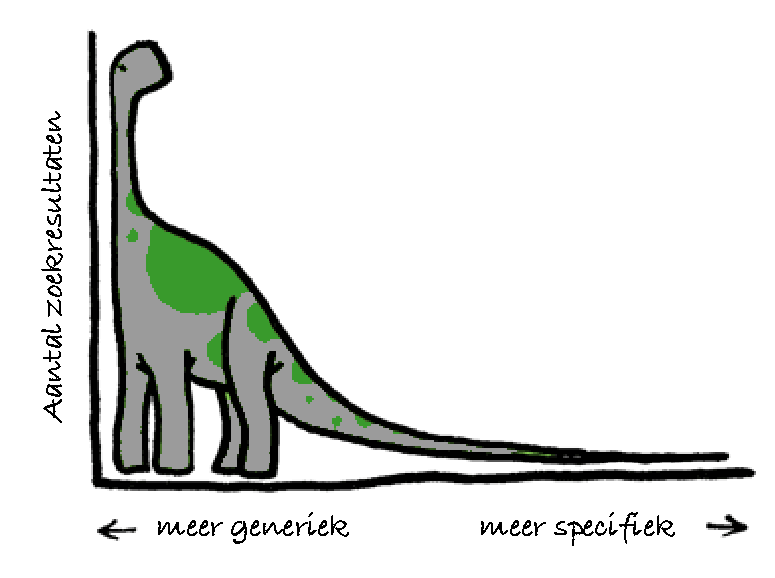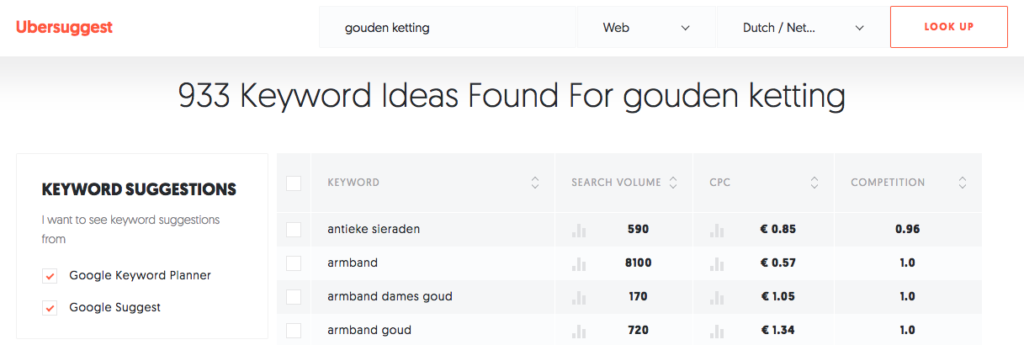Menu
Table of contents
With such research, you find out what search terms people use to find businesses like yours. Which terms you want to be found on, in other words.
But how exactly do you find those keywords? And how can you determine the best keywords for yourself?
I'm going to explain that to you. All you need is access to an Internet connection, a cup of coffee, an hour of your time and a little common sense.
Before you begin...
Before you begin, I'll tell you a little about keywords. Something many businesses often don't know:
The terms people use to find a business, product or service are often longer than one or two words. Longtail keywords, we call them.
About 70% of everything entered into Google consists of those long-tail keywords. That's why we focus primarily on these keywords.

Granted, those long-tail keywords are searched for less each month than general keywords. Less volume and therefore less interesting.
You might think. Potentially, however, they bring in much more than those generic keywords. Go figure:
Suppose you are a jeweler and you sell gold necklaces. Then you probably want to be found on the term "gold necklace. There are a lot of searches for that, but the competition is fierce. Scoring on that term is going to take a lot of time (and money!) and besides, you're not sure if you can offer that searcher exactly what they want.
A long-tail variant could be 'gold necklace with diamond heart'. That may not get as many searches, but the competition is a lot less and the chances of giving the searcher exactly what they want are a lot higher.
And so the chances of actually selling something are a lot higher. At least if-if it shows up on a page of gold chains with diamond hearts....
Good, you get the idea. Then now you can start your research and determine the best keywords!
And if you'd rather watch or listen to a podcast, we've got that covered, too.
Finding long-tail keywords
A little knowledge of your product or service will go a long way, but chances are you'll forget something or a certain keyword combination simply doesn't come to mind. Fortunately, Google helps you with that by giving you suggestions.
Just type "gold chain" into the search bar, but don't hit enter. Google will already give you some suggestions for potentially valuable long-tail search terms. Handy!

But of course, these are far from all the longtail variants of "gold chain. Just type 'gold chain a' and look at the suggestions again. Now you'll get even more specific suggestions!
And now do it with 'gold chain b'... And 'gold chain c'....
Well, you get where we're going.
Fortunately, you don't have to do all that yourself. There are some very handy tools that compile all those suggestions for you. KWfinder is one of them. Just enter your keyword, set it to Dutch and it will give you quite a few suggestions.
You can also use Ubersuggest. It does the same thing and also gives an indication of how often your keyword is searched for per month: the volume. Which brings us directly to the next point: checking volumes.
Pro tip: for less than €28 per month you can find out the very best keywords with KWFinder. In my experience, you'll have this out of your pocket in 1 week. KWFinder saves you time and provides you with better content.
Checking volumes
You should now have a list of quite a few long-tail keywords. But it would be a waste to focus on keywords that no one or very few people are searching for.
Therefore, you'd better check the corresponding volumes. In Google's Keyword Planner you can easily find them. Very handy of course, but there is one problem: you need a running Adwords campaign for it.
Don't you have one? Or have no idea what I'm talking about? Then you can use Ubersuggest, KWfinder or SearchVolume.io to get a good idea of your keywords' volumes as well.

Competitive analysis
Good keyword research is not complete without competitive analysis. After all, your competitors may also have read this blog and are targeting the same long-tail keywords as you.
Now that doesn't have to be a bad thing, but if there's a lot of competition (including some of the big players in your industry) then it's probably going to take a lot of time and effort to rank for that particular keyword. And it's often not worth it.
You can quickly estimate how many Internet pages are scoring for your keyword by entering the following in Google's search bar:
allintitle: "your keyword here"

With this term, Google searches all pages that have your search term in their title. You can conveniently assume that all of these pages are created to rank for that search term.
If Google gives 140,000 results, then you know the competition is high. However, if Google indicates that there are only 93 results, then you know that there is little competition and therefore you can score relatively easily with on that keyword!
Note! This is a quick indication of the possible amount of competition. It says nothing about the actual competitors and how "strong" their position is. For that, too, you're better off using KWFinder 's difficulty tool!
And now ... determining the best keywords!
Determining the best keywords is now very easy. From your original list of long-tail keywords, simply remove the terms with a) little or no search volume and b) way too much competition.
What you are left with are the keywords with which you can gain a lot with relatively little investment. And that's exactly what you want to achieve with good keyword research.
Final touch: check the intention
Okay, you now have a list of interesting keywords. But that doesn't get you there.
Google's algorithm is now also able to figure out the searcher's intent based on the keyword. And you need to match that with your content to rank well.
A simple example: your keyword research shows that "gold chain options" is a long-tail keyword with volume and little competition. However, you can imagine that people entering this search term do not want to buy gold jewelry, but want to be informed about gold chains.
So it makes no sense to rank here with a page where people can buy necklaces. Then it's better to choose an informative blog.
So do you have a page you want to optimize? Then hang a relevant keyword on it. After all, determining the best keywords is also about intent.
If you're not sure, you can Google the keyword yourself and check the top results. What are they talking about? What needs does their content meet?
Chances are, Google sees that those pages are a perfect match for the searcher's intent (which is why they already rank so high)!
Doing even better keyword research?
You have now mastered the basics. And you can probably get by with that.
But don't have the time to carry it out? Or do you want some more results from a keyword research? Contact me for advice, a complete keyword analysis or for an entire SEO process.
I'm happy to help you find the right keywords!
This article was written on March 20, 2018 and updated on March 25, 2022.
What is keyword research?
A keyword research is an analysis of the terms people use in Google. With such a research you try to determine which relevant keywords people type in that have to do with your products, services, company or blog. This way you know exactly what you need to write about and what you need to optimize your text for to get higher rankings in Google!
Is keyword research important for SEO?
Yes, a keyword research is important for SEO. This is because it provides up to essential information and data that is important for the online growth of your business. After all, a keyword analysis tells you what people are searching for, shows you how much competition there is for those terms and helps you write content that increases your visibility, rankings and number of visitors.
How do you do keyword research?
Doing a keyword research is basically quite simple. Write down everything relevant to your business and try to find the long-tail keywords from those. Those are longer variants of the original keyword. Then use a tool to see how often those terms are searched for, analyze the competition and check the intent.
What keywords should you use?
From your keyword research comes a long list of terms. But which keywords should you use? Very simple. Remove all the terms that are not or hardly ever searched for (low search volume) and the keywords with a lot of competition. What you are left with are keywords with which you can score relatively easily. Exactly what you want!












2 Responses to "Keyword research: here's how to determine the best keywords"
Gold
Very interesting thank you!